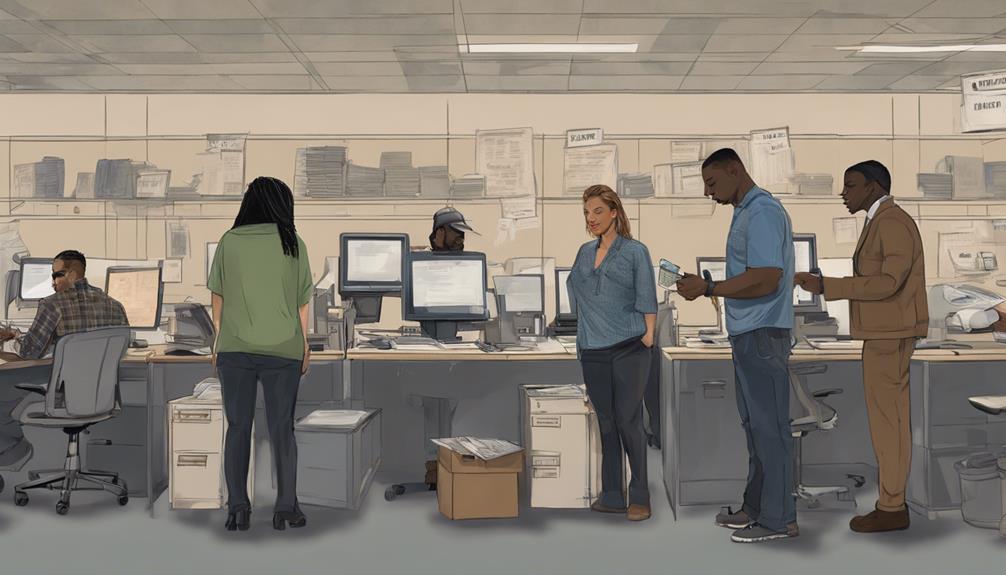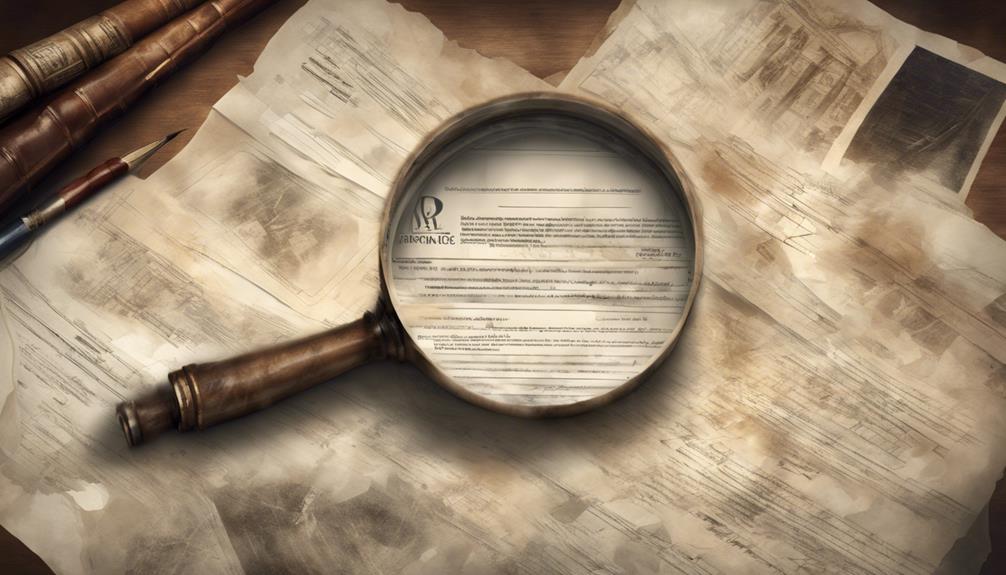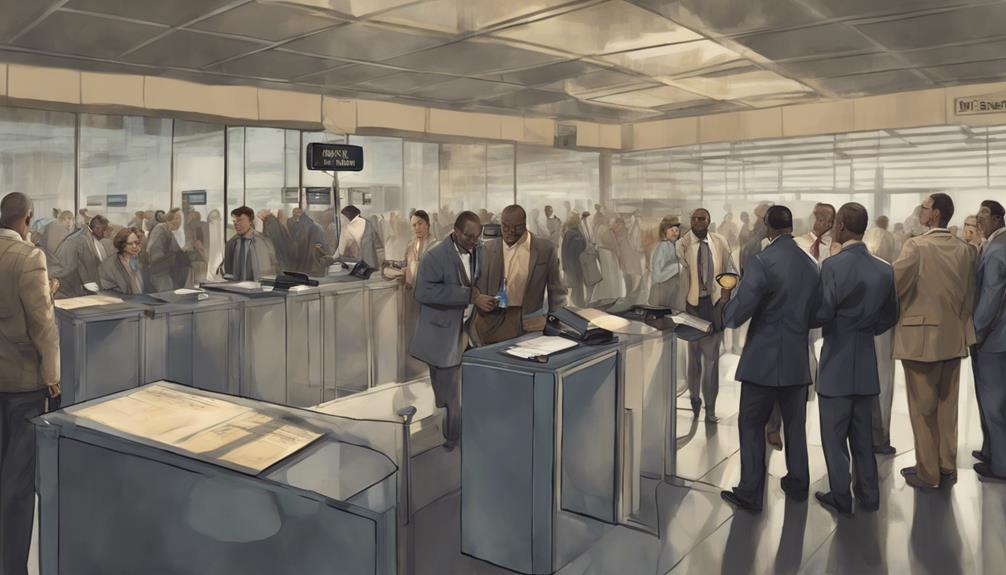Amazon partners with third-party companies like Sterling Infosystems and Accurate to conduct thorough background checks for all job applicants. These third-party providers assist in verifying criminal history, employment records, and educational backgrounds, among other important aspects. By engaging with reputable agencies, Amazon guarantees in-depth screening processes to make informed hiring decisions. For more details on Amazon's background check procedures and strategies, further insights are available in the researched data.
Key Takeaways
- Amazon uses third-party companies like Sterling Infosystems and Accurate for background checks.
- Sterling Infosystems conducts over 16 million checks annually for Amazon.
- Accurate is a trusted provider for detailed verifications for Amazon.
- These external providers ensure compliance with FCRA and EEOC guidelines.
- Amazon relies on these verification partners to enhance the background check process.
Amazon Background Check Process

The Amazon background check process guarantees thorough screening of all employees, regardless of their role within the company. Amazon partners with third-party companies like Sterling Infosystems and Accurate to conduct these checks.
These background checks are mandatory for all individuals seeking employment at Amazon, regardless of the position they're applying for. In some cases, Amazon may extend a job offer to a candidate before the background check is complete, with the offer contingent on the successful screening.
Candidates are typically provided with a link or log-in information for the screening process, which may vary in depth depending on the specific role applied for at Amazon. This meticulous screening process ensures that Amazon maintains a safe and secure work environment for all its employees and customers.
Third-Party Providers for Verification
Third-party providers such as Sterling Infosystems and Accurate are essential to Amazon's background check process. These companies offer specialized data analytics and verification services tailored to Amazon's needs.
Verification Partners
How do third-party providers contribute to Amazon's background check process for verifications?
Amazon relies on third-party providers like Sterling Infosystems and Accurate to assist in conducting thorough background verifications, including checks on criminal history, education, and employment. These verification partners play a pivotal role in ensuring that Amazon's background check processes comply with the guidelines set forth by the Fair Credit Reporting Act (FCRA) and the Equal Employment Opportunity Commission (EEOC).
Sterling Infosystems Inc., for instance, handles a significant volume of over 16 million background checks annually for Amazon, underscoring the scale and importance of their partnership. Additionally, Accurate is another trusted third-party provider that Amazon leverages to obtain accurate and detailed background verifications.
External Screening Providers
Regularly teaming up with external screening providers enhances Amazon's background check process by conducting thorough and unbiased verifications. Amazon relies on trusted third-party companies like Sterling Infosystems and Accurate for carrying out detailed background checks. These external screening providers specialize in data analytics, verification services, and criminal background searches, offering Amazon access to a wealth of information to make informed hiring decisions.
Sterling Infosystems, one of Amazon's key partners, conducts over 16 million background checks annually, demonstrating their expertise and efficiency in the field.
Applicant Status Tracking System

The Applicant Status Tracking System offered by Amazon enables candidates to monitor the real-time progress of their background checks. Through this system, candidates can access the Amazon Jobs website to stay updated on the status of their background check and any pending documents.
This feature provides candidates with valuable real-time updates, allowing them to stay informed about the background check process and any potential delays that may arise. Additionally, the system sends notifications via email or the Amazon candidate portal to alert candidates of any changes in their background check status.
Focus Areas of Amazon Checks
Amazon's background checks primarily focus on criminal history, employment verification, and educational background. These key elements are vital in evaluating a candidate's suitability for a position within the company.
Amazon's Screening Partners
Partnering with specialized screening firms like Sterling Infosystems and Accurate, Amazon prioritizes data analytics and validation in its background checks. Sterling Infosystems focuses on leveraging data analytics to guarantee precise validation processes for Amazon's background checks. On the other hand, Accurate plays a significant role in conducting criminal history checks, verifying employment records, and authenticating educational backgrounds for Amazon's job applicants. These screening partners assist Amazon in ensuring that all background checks are thorough, precise, and in line with the Fair Credit Reporting Act (FCRA) and Equal Employment Opportunity Commission (EEOC) guidelines.
| Screening Partner | Focus Areas |
|---|---|
| Sterling Infosystems | Data analytics and validation |
| Accurate | Criminal history, employment, and education authentication |
Key Background Check Elements
Sterling Infosystems and Accurate play integral roles in safeguarding the accuracy and thoroughness of Amazon's background checks, focusing on key elements such as criminal history, employment verification, and driving records. Criminal history details encompass local, state, and federal charges, convictions, and parole information. Amazon carefully assesses the nature of the crime, the time since conviction, and its relevance to the job to make informed decisions based on background check findings.
Employment verification is a critical component of Amazon's screening process to confirm the precision of an applicant's work history and suitability for the position.
Additionally, driving records are reviewed to evaluate a candidate's driving behavior and ensure adherence with Amazon's standards.
Timeframe for Background Checks

The timeframe for background checks at Amazon typically ranges from 1 to 4 weeks, depending on the specific role and the complexity of the check. While most checks are often finalized within 3 to 10 days, this range can extend up to a month in some cases.
Delays in Amazon background checks may stem from various factors such as the time required for data gathering, extensive review processes, or the need for additional verifications.
Throughout the background check process, applicants may encounter different status designations like Pending, Awaiting Documents, Suspended, Complete, Clear, Consider, and Dispute, indicating various stages of the check.
To stay informed about the progress of their background check, applicants can conveniently monitor the status by logging into the platform designated for the intake process. This structured approach enables transparency and keeps applicants informed about the status of their Amazon background check.
Handling of Negative Findings
Evaluating adverse background check findings at Amazon is done on a case-by-case basis. Candidates with negative findings aren't automatically disqualified, as Amazon assesses the nature and relevance of these findings to the job role.
Communication regarding negative findings is structured and informative, ensuring that candidates understand the implications and have the opportunity to provide context.
Amazon integrates background check results into the final hiring decisions, weighing them alongside other relevant factors to make a thorough assessment of each candidate.
By handling negative findings in this manner, Amazon aims to make fair and informed hiring decisions that take into account the full scope of an individual's qualifications and background.
This approach enables Amazon to assess candidates holistically and provide them with the opportunity to address any concerns that may arise from their background check results.
Processing Delays and Solutions

When faced with processing delays in background checks, Amazon addresses various factors that contribute to extended wait times. These delays can stem from manual record retrieval, data confirmation processes, or the need for additional checks, especially for roles that involve security or access to sensitive information.
Court or institutional delays are also factors that may impact the duration of background check processing. While most delays can be resolved within a few days, concerns may arise if the process extends beyond four weeks, particularly for roles that require more detailed investigations.
To tackle these processing delays, Amazon continuously refines its procedures, streamlining the verification processes and enhancing efficiency in record retrieval. By employing strategies to expedite the verification and validation steps, Amazon aims to minimize processing times and guarantee a smoother background check experience for its applicants and employees.
Amazon's Approach to Criminal Records
Amazon evaluates applicants with criminal records based on specific criteria outlined by the EEOC guidelines. When making hiring decisions, Amazon considers factors such as the nature, severity, recency, and relevance of the offense.
Violent crimes, sexual offenses, and high-level theft are viewed more critically. Additionally, the relevance of the conviction to the job role plays a significant role in Amazon's assessment of candidates with criminal records.
Successful candidates are informed of their passing status via email or the Amazon candidate portal. On the other hand, unsuccessful candidates receive structured communication, including pre-adverse and adverse action notices, following Amazon's established process.
Importance of Quality Checks

Quality background checks play a crucial role in making sure accurate information is utilized for making hiring decisions at Amazon. By prioritizing quality checks, Amazon can prevent wrongful disqualifications and potential legal issues.
Partnering with qualified private investigation firms like Integrated Security Services enables Amazon to conduct thorough and precise background screenings. Integrated Security Services delivers detailed and thorough reports, empowering Amazon to make informed hiring choices.
Attention to detail in background checks is essential for maintaining fairness in the hiring process and avoiding legal ramifications. Amazon's commitment to quality checks underscores the importance of relying on accurate information to make sound hiring decisions.
Frequently Asked Questions
Who Does Amazon Use for Their Background Checks?
When conducting background checks, Amazon relies on third-party companies like Sterling Infosystems and Accurate. These trusted providers handle criminal background searches, education verification, and employment checks. Disclosure of the specific provider occurs during adverse action events.
What Will Disqualify You From Working at Amazon?
Certain felony convictions, especially violent crimes, sexual offenses, and high-level theft, may disqualify an individual from working at Amazon. The nature, severity, recency, and relevance of the felony are essential factors considered in disqualification decisions.
How Long Does an Accurate Background Check Take for Amazon?
Efficiency matters in background checks. An Accurate background check for Amazon typically takes 3 to 10 days. Factors like data availability and verification requirements influence the timeline. Real-time updates can be accessed via the candidate portal.
Does Amazon Use Sterling Background Check?
Amazon does use Sterling Infosystems for background checks. Sterling is a trusted third-party provider handling data analytics and verification. It conducts criminal background searches for Amazon job applicants. Sterling processes over 16 million checks annually, playing an essential role in Amazon's screening process.
What Can I Expect from Amazon’s Background Checks for Employment?
When applying for a job at Amazon, you can expect the company to conduct thorough background checks. These checks may include criminal history, employment verification, and education verification. It’s important to note that Amazon’s background checks are not free online background checks legit, as they are conducted by professional agencies.
Conclusion
To sum up, Amazon depends on third-party providers to carry out thorough background checks on potential employees. Through their efficient applicant status tracking system and focus on key areas, Amazon guarantees the quality and accuracy of their screening process.
By prioritizing detailed checks and timely results, Amazon upholds a high standard for hiring practices, establishing a safe and dependable workforce.
Like a well-functioning machine, Amazon's background check process runs smoothly, securing a trustworthy environment for all.









